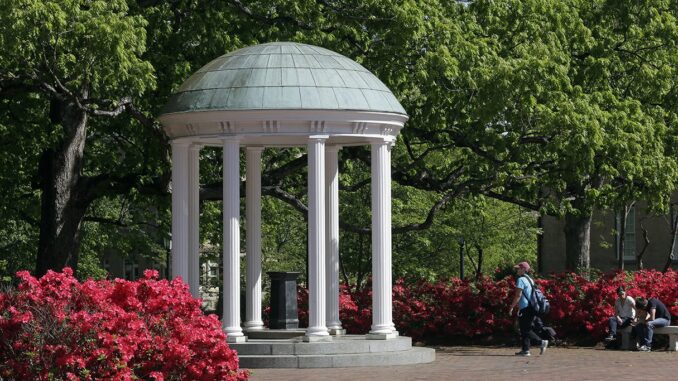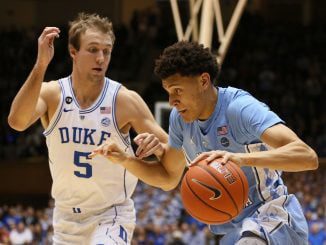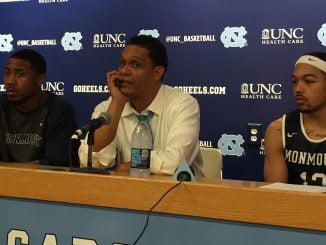
RALEIGH — The University of North Carolina at Chapel Hill Board of Trustees (BOT) unanimously passed two resolutions at its July 27 meeting.
The Freedom of Speech resolution was introduced and read by BOT member Dr. Perrin Jones.
“The Board of Trustees reaffirms its commitment to academic freedom as embodied in the Chicago principles and the Kalven Committee Report on the University’s Role in Political and Social Action, which is attached hereto as Attachment A,” the Resolution on the Affirmation of Academic Freedom and Freedom of Speech reads in part.
The University of Chicago Kalven Committee Report on the University’s Role in Political and Social Action outlines how colleges and universities should stay neutral and abstain from political or social commentary in their official capacities.
In an interview with North State Journal, Jones said the Kalven Report was added because “we felt like institutional neutrality was of paramount importance for academic freedom to exist on campus.”
“The reason we passed the resolution is we felt it was important for the board to show that the principles of academic freedom are of paramount importance to us and to the university,” Jones told NSJ.
During the meeting, Jones remarked that the people who entrusted them to lead the university feel that “Carolina has lost her way” and that “It is no longer centered on the pursuit of knowledge and exposure to the greatest ideas and discoveries of the human mind and an environment that nurtures open debate and inquiry.”
“They are concerned our students are learning what to think rather than how to think,” Jones said.
After brief remarks, the resolution passed unanimously.
The student fees resolution was brought forward and read by BOT member Teresa Artis Neal.
The resolution on “Viewpoint-Neutral Access to Mandatory Student Fees” states that “the Chancellor shall direct appropriate University personnel to develop and issue policy requiring that the Senates of the Undergraduate Student Government and the Graduate and Professional Students Government must appropriate all student fees in a viewpoint-neutral manner, including any necessary procedures required to ensure compliance with this requirement.”
Neal said her resolution was also aligned with promoting academic freedom and expression.
“The intent here is to elevate actions that are currently reflected in the student code,” said Neal.
“My reasoning for this is because I did not want the policy that currently exists just to sit in the student code,” Neal said. “Because as I was seeing it, the student body over that code, being the student senate, would have authority then if there were no votes to change it. And that cannot happen.”
Neal explained that they were not changing the distribution of funds by the student senate but any changes to mandatory fees policies needed to be elevated to the university level and that action would strengthen the alignment with current law requirements.
Both resolutions appear to be timely additions given recent activity at UNC Chapel Hill.
The James G. Martin Center for Academic Renewal’s President Jenna Robinson documented some less than neutral statements made by official UNC-CH accounts following the U.S. Supreme Court’s recent ruling on returning abortion rights to the states in the case of Dobbs v. Jackson Women’s Health Organization.
Robinson’s article also notes an order issued by the UNC-CH Student Body President placing conditions on spending by the undergraduate student government’s executive branch.
Specifically, the order “requires” the executive branch of the student government to use “sellers and contractors who support and uphold reproductive freedom” while prohibiting “contract[ing] or expend[ing] funds to any individual, business, or organization which actively advocates to further limit by law access to reproductive healthcare, including, though not limited to, contraception and induced abortions.”
Robinson notes that the order “in addition to violating the principle of institutional neutrality, is probably illegal. Student government, which is funded by mandatory student fees, must distribute those fees in a viewpoint-neutral way.”
Prior to the votes on the resolutions, the results from a faculty-led project on “Free Expression and Constructive Dialogue at the University of North Carolina” were presented. It was noted that first-year students and females were overrepresented in the survey and a link was included to the accompanying report.
The work was based on a survey examining undergraduate experiences with free expression at eight UNC System schools that included Appalachian State University UNC Charlotte, NC Central University UNC Greensboro, UNC Asheville, UNC Pembroke, UNC Chapel Hill, and UNC Wilmington.
“A theme that runs throughout our results is that students worry that their comments about politics will be misunderstood, and perhaps used against them,” the report’s summary states. There is also evidence that constructive engagement is harder when the stakes are higher when the format is more formal, when there is an audience, and when students do not know their interlocutors very well.”
Key findings from the presentation showed faculty “generally do not push political agendas,” however a percentage of students disagreed with the statement “The course instructor encouraged participation from liberals and conservatives alike.” Respondents identifying as conservative had higher rates of disagreeing with the statement than those identifying as moderates and liberals with one exception; 21% of moderates at UNC Pembroke disagreed versus ten percent of conservatives.
The presentation also revealed that respondents felt campuses “do not consistently achieve an atmosphere that promotes free expression.” That finding was further broken down by concern for peers, instructors and repeated self-censorship. Across the schools included in the survey, between 17 and 22% of students say they self-censored more than once.
When it comes to speakers invited to campuses, 32% of liberals, 56% of moderates and 86% of conservatives said there were too few opportunities to hear conservative speakers. Those numbers reversed and dropped for opportunities to hear liberal speakers to 21% of liberals 14% of moderates and 8% of conservatives.



